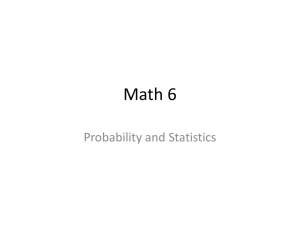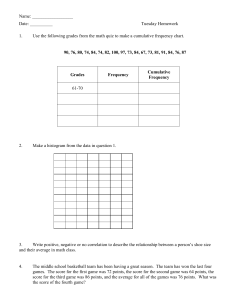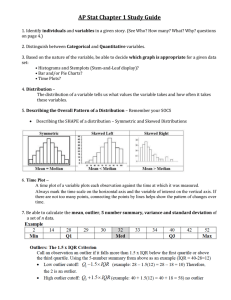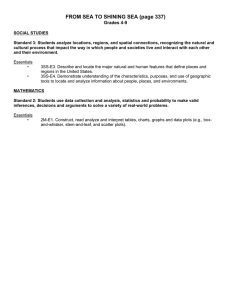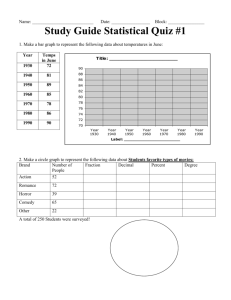DATA DISPLAYS AND ANALYSIS INTEGRATED MATHEMATICS
advertisement
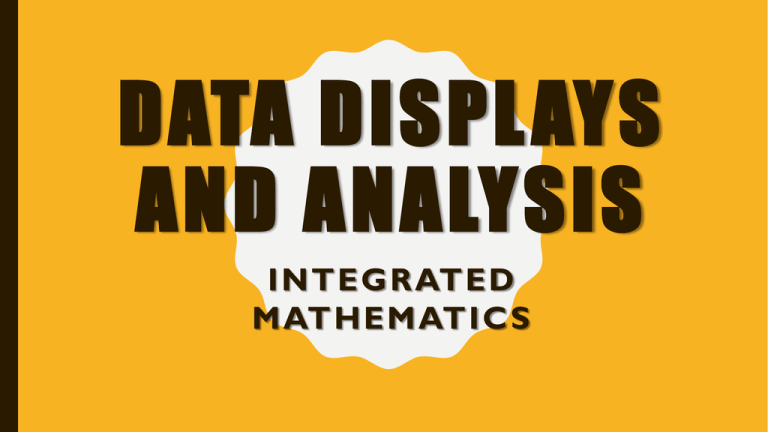
DATA DISPL AYS AND ANALYSIS INTEGRATED MATHEMATIC S OBJECTIVE • Students will analyze graphical depictions of statistical data. • Students will construct graphical depictions of statistical data. SCATTER PLOTS • Scatter plots are used to examine two sets of data and to investigate the possible relationship (or correlation) between two variables. • The pattern of the points suggests how closely the data is related. (Correlation) SCATTER PLOTS • Example:This scatter plot is used to determine the correlation between the number of years an employee has worked at a company and the number of vacation days he or she receives. • If the data displayed on the scatter plot forms a line that RISES from left to right, the variables are said to have a positive correlation. • This "trend line" (or line of best fit) allows predictions to be made based on current data. • If the data displayed forms a trend line that FALLS from left to right, the variables have a negative correlation. BAR GRAPHS • Variables that are distinct and unconnected between data points are best represented by a bar graph. Example: How many more students chose lunch line 3 than lunch line 2? LINE GRAPHS • Variables that have continuous intervals that are unbroken sequences are best represented by a line graph. Jason, Steven, and Andrew made a line graph to show the cumulative number of miles they had run for five days. At the end of which day had they run a cumulative total of 32 miles altogether? CIRCLE GRAPHS • A percentage is a part of a whole. A circle graph is an excellent way to show how the relative sizes of the parts compare to each other and to the whole. • The circle graph is the type of graph most commonly used for displaying percentages. If Karie's take-home pay is $3,000 per month, how much money has she budgeted per month for housing and food? BOX-AND-WHISKER PLOTS • A box-and-whisker plot takes a large amount of data and clearly identifies the lowest value, lower (first) quartile, median, upper (third) quartile, and the highest value. • The line drawn through the interior of the box identifies the 50th percentile, or the median, of the data. • The lines that make up the sides of the box represent the lower and upper quartiles. The lower quartile identifies the 25th percentile and the upper quartile identifies the 75th percentile. • The difference between the upper and lower quartiles is known as the interquartile range. Which city had a higher median temperature in May and by how many degrees? STEM-AND-LEAF PLOTS • Both a stem-and-leaf plot and a histogram summarize the shape of a batch of data (the frequency distribution). • However, only a stem-and-leaf plot easily displays the range of data (by showing the lowest and highest values) and each individual data point. What are the mean, median, mode, and range for the above stem-and-leaf plot? PREDICTIONS • Use the graph to predict in which month the deli will sell the most amount of ham this year. • The company is expecting to have $1,500,000 in the budget for salaries this year. Using the graph, predict the amount of money that will be allocated to the accounting department's salaries this year. Using the graph, predict during which month the hospital can expect to have the most boys born this year.
